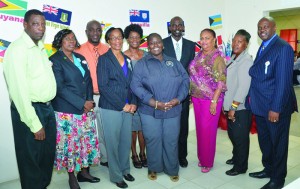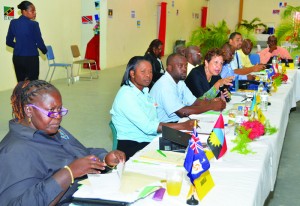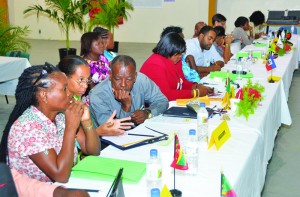


Teachers in Anguilla, and across the rest of the Caribbean region, are contending to be paid for their work in preparing and supervising students doing the School-based Assessment (SBA).
This was one of the matters spoken about at the Executive meeting of the Caribbean Union of Teachers (C.U.T.) held in St Maarten and Anguilla on December 5 and 6. The teachers want the principle of financially rewarding those who travel in the region to mark other components of the CXC examination to be applied to them.
The case of the teachers was outlined by the President of C.U.T., Marvin Andall, a national of Grenada. (He was first elected to that post in 2011, re-elected this year, and is now in his final term. He is a Principal of one of Grenada’s schools.) He told The Anguillian: “The issue for compensation for marking of SBAs is one that is of concern to most of the members,” he stated. “We, of the C.U.T., believe that teachers incur additional work, that they would not have otherwise incurred, for marking and administering the SBAs for the purpose of the Caribbean Examination Council.
“Some may argue that it is part of the duties of teachers, but it is not. It is more than their normal duties. It requires more than the regular examinations that teachers would do. All the other aspects that are involved in the exam, where persons have to expend their time and energy, they are compensatedfor, except for that group of persons who mark the School-based Assessment exam which is an integral part of the Caribbean Examination Council examinations for secondary schools.”
Asked to further explain the matter, Mr Andallsaid: “Those who travel to other countries to mark the scripts are paid, and those who invigilate the exams are paid. Persons who do the supervisory practical component are compensated. But those who do the component of the exam in the school – the School-based Assessment exams – which are supervised and marked by teachers are not compensated for their work.”
MrAndall said there had been “tremendous complaints” about the matter. He was asked why he thought that group of teachers were not being compensated. “I assume for commercial reasons because CXC is, to an extent, a bit about profit and may fundamentally believe that it will undermine its profit margin,” he replied. “Governments and Ministers of Education also feel that they may not have the necessary funds to pay for those SBA exams. So this matter is the hue and cry of the teachers of the Caribbean.”
Asked what he had to say to teachers in the Caribbean region, Mr Andall replied: “We have a tremendous challenge on our hands in these times. It is to have the best conditions of learning for our students and working conditions for our teachers. We have to continue that fight. It is not an easy one, but it is critical because the future of our region depends on us succeeding in the job we do; and to do our job effectively, we have to be well outfitted…and, as such, we have to be forceful. We have to be vigilant. We have to be proactive in terms of having the best conditions possible for our teachers to teach and our students to learn.”
Ms Emma Ferguson, President of the Anguilla Teachers Union, was pleased that the ATU was able to host the C.U.T. meeting. She outlined some of the other agenda items. “We are looking at the C.U.T. budgets for programmes that we can initiate throughout the region and in which all member units can participate,” she explained. “We are also looking at best practices which the larger unions can share with the smaller ones, and what can be used for capacity building.”
The C.U.T. comprises 24 Teachers Unions across the region. Of that number, 22 were at the meeting in Anguilla at the Rodney MacArthur Rey Auditorium.








